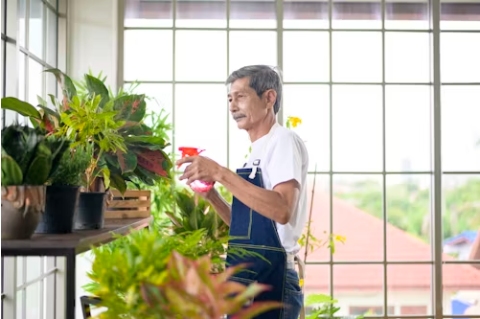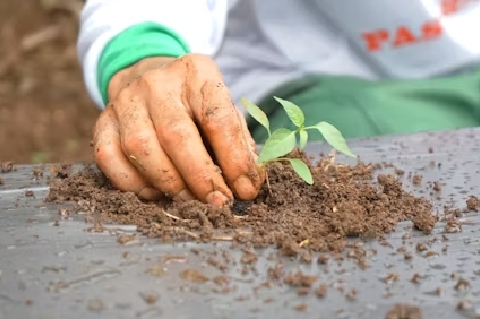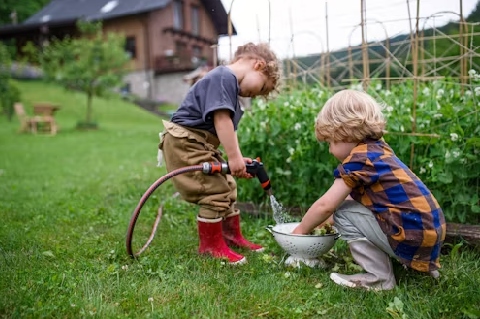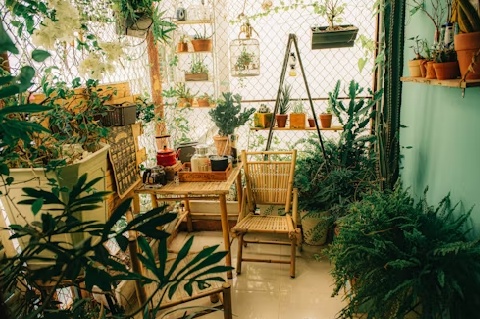Stress and anxiety are now a part of daily life in today’s fast-paced world. Many people look into natural ways to heal their mind and body. Gardening as therapy comes out as a powerful solution. It is not just a hobby. The process is of healing, attaining peace of mind, and self-care with the help of nature. Through this blog, we will learn how gardening can help in the overall well-being of the person, emotional health, and balance life.
What is Gardening Therapy?
Gardening therapy, also known as horticultural therapy, is a way of healing. This practice uses gardening activities to achieve results. It includes planting, nurturing, and ways of connecting with nature. This type of therapy is recommended for those dealing with stress, anxiety, and those recovering from illnesses.
Gardening has no side effects, like in cases of medicines. Instead, gardening calms the mind, helps in restoring energy, and gives a sense of completeness.
Mental Health Benefits of Gardening

1. Reduces Stress and Anxiety
One can reduce stress by working and spending time with plants. Digging soil, planting seeds, and watering plants calm the mind. Hence, many people consider gardening stress relief really effective.
2. Fights Depression
Through studies, it is proven that regular gardening can help reduce the symptoms of depression. The exposure to sunlight gives vitamin D to the body, which gives energy and works as a mood lifter.
3. Improves Mindfulness
Along with patience, gardening requires attention. Small tasks make you focus more and keep you occupied. Gardening and mindfulness are connected to each other in such a way.
Physical Health Benefits of Gardening
1. Boosts Immunity
Through gardening, you are exposed to different microbes of the soil that are beneficial. They, thus, strengthen the immune system naturally.
2. Acts as Exercise
Physical activities like weeding, digging, and planting keep you occupied. This helps in improving the strength, stamina, and flexibility. Hence, gardening is also considered as “ green gym”
3. Promotes Better Sleep
Through gardening, you get exercise, and you get fresh air from outside. Both of these relax your body and mind and help in maintaining natural sleep. Thus, they have peaceful and deep sleep.
Gardening for Emotional Healing

-
Builds a Sense of Accomplishment
As you see a seed grow into a plant, you feel pride and happiness. This builds the feeling of achievement and boosts self-esteem.
-
Creates Emotional Connection
Plants need care; they build the feeling of love and responsibility with time. This emotional connection builds comfort and reduces loneliness.
-
Encourages Patience and Hope
Since plants take time to develop, waiting for the bud to grow teaches people patience and hope. This, thereafter, builds the emotional well-being of the person.
-
Gardening and Social Therapy
Gardening is not necessarily a solo activity. Nowadays, community gardening is also gaining popularity. It brings people together, helps them reduce the feeling of isolation, and promotes oneness and teamwork.
Working together can help make friends. It can strengthen the bonds with socials and also help in communicating and improving mental health.
Gardening as Therapy for Children and the Elderly

- For Children:
Gardening improves focus, calms nervousness, and builds a sense of
- For the elderly:
This reduces isolation of the elderly, keeps them moving, and improves memory. Nursing homes also use therapeutic gardening activities for helping senior citizens.
Gardening and Recovery from Illness
Doctors are now also recommending horticultural therapy, which helps patients to overcome trauma, surgery or any chronic diseases. When you care for plants, you have relaxation. It reduces pain and increases the speed of recovery.
Simple Therapeutic Gardening Activities
Here are some simple tips for those new to gardening:
- Plants like tulsi, mint, or basil can be grown in Indore.
- Plants like snake plant or aloe vera should be grown
- Spend 10–15 minutes a day watering
- Have your own balcony garden and grow flowering plants
- Try growing vegetables to connect with sustainable
These small practices can transform your mood and lifestyle.
Gardening and Mind-Body Connection

Nature has different effects on human emotions. Gardening awakens all your senses through touching soil, smelling flowers, seeing greenery, and listening to the sounds of different birds. This then creates harmony in mind and body.
Why Gardening Works as Therapy
Gardening is a combination of three powerful healing elements:
- Nature– Reduces the stress of the mind and makes you
- Mindfulness– Keeps you in the present, aware, and
- Movement– Provides physical activity without much
This mixture of activities makes gardening effective and the easiest form of therapy.
Tips to Make Gardening More Therapeutic
- Choose plants you like and would like to see them
- Create a routine for watering and
- Avoid perfection and enjoy the
- Use gardening as a break from
- Try meditating near your
These small steps increase the therapeutic effect of gardening.
Conclusion: Healing Through Gardening
Gardening as therapy is not just about plants. It is a way of healing yourself, and nature helps in the process. Gardening can help reduce stress and help fight depression. It boosts the immunity of the person and grows the feeling of happiness.
Gardening can bring peace and balance in life so no matter if you have a big garden or a small balcony. Even a few pots on your windowsill can have a good effect. A single seed can also bring balance and calmness to your life. As you see it nurture it, you will witness how it grows into a plant and heals your mind, body, and soul.
